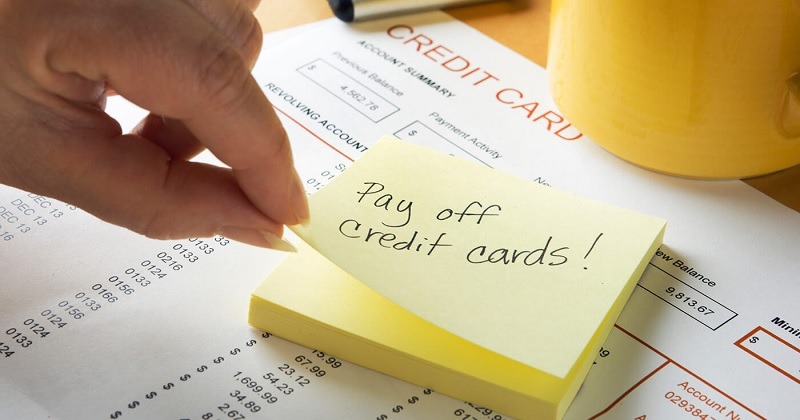
There are time when sometimes we find ourselves in the most unfavorable of situations: low on money, high on debt and nowhere to go.
You are looking for options and you can’t find them, which leaves you wondering—what happens if I stop paying my credit cards? You’ll face:
- Late Fees
- Higher penalty APRs
- Account being charged off
- Wage garnishment
- Legal suits, and
- Reduced Credit Scores
We’d recommend that you keep paying the minimum amount on your credit card bill rather than stopping payments altogether.
What Happens if I Stop Paying A Credit Card?
In most cases, your creditor approved your request for credit card(s) so that you borrow and pay it back on time. However, when things don’t get your way, your credit card issuer has to find ways to get the money back from you.
So when you miss out on a payment, but make it up for it in the next payment, your credit card company won’t mind. But please do note that credit card companies have a time frame that defines stages of a credit card delinquency.
Credit card companies usually follow a default procedure, here’s how the time frame usually looks like:
- Payments 30 to 59 days late
- Expands to 60 to 89 days late
- Goes up to 90 to 119 days
- If it’s been 120 to 180 days then it’s a charge off
Continue reading the sections below to see how the different stages of credit card delinquency can affect you if you ever stop paying your credit cards.
30 Days Late
If it’s below 30 days, the credit card issuer usually won’t ask why you didn’t pay. But you might get a call to remind you that you have to pay, but it’ll be just that.
But when you’re 30 to 59 days late, you can expect your credit card tree to start shredding leaves. Do give your card issuer a call and they might waive the late fees, if you have a legit reason for the missed payments.
What happens to my credit score?
Whether you have a legit reason for missing out on a credit card payment. Your credit card issuer will report to the three credit bureaus, so it will take a hit on your credit score.
What about interest and fees?
You will be charged with a late fee along with the interest you owe on the remaining balance.
So keep in mind that if when you stop paying your credit cards for more than a month, the damage is serious, but it can be contained with extra work, it’ll only get worse if you continue to not pay.
60 Days Late
If you still haven’t paid your credit cards when it’s been more than two months, you should consider this as your “last call” before it gets worse than where it already is.
Know that every credit card company has an in-house collection department, this is where you’re going to get a call from first. Companies usually prefer dealing within their own before moving to the debt collection agency.
What happens to my credit score?
If you are 60 days late on your credit card payments the impact won’t be as bad as it was when you crossed the 30-day mark. So if you get back on track and continue your payment after the 60 day default, your credit score damage can be restored.
What about interest and fees?
The high penalty APR means your debt payoff expedition will be stretched even more as well as getting more phone calls from the credit card company.
If you continue to not pay after 60 days, your account will be handed over to the debt collection agency.
90 Days Late
If you find yourself not paying your credit cards for three months then you can’t return. If your credit card company has its own collection department then your case would be handed on to them.
Debt collection agencies will start calling to notify that your credit card payments are due. If you continue to not pay after the 90-day mark, credit card companies might think that you are in the state of financial trouble. They’ll try to offer credit help advice to help you out.
120 to 180 Days Late
At this point of time, your credit card company will sell your debt to a debt collection agency, writing it as a charge off. A charge off happens when you are 120 to 180 days late, your credit card company sells your debt to a debt collection agency and writes it down as a financial loss in the books.
So if your credit card debt is charged off, your credit report will be blemished with the damage—expect your credit score to plunge.
Your debt has been sold to a new owner, who now has complete authority to collect the dues. Debt collecting agencies will go far to take back what you owe. The debt collectors will come after you and you cannot refrain from paying back the credit card dues.
What should you do when you’re late on payments?
If you’re late on your payments, here are some things you can do in case you’re way in credit card debt:
Your credit card payments come out of your income, so if you think that your credit card payment is way too much in comparison to what you earn, stop using it. Start freeing up more money to pay off your credit card debt.
Cutting expenses don’t help as much as inflating your income does. Find ways to increase your income, check out some of the best ways to make money online in your free time down below.
If this is a temporary problem, you can seek credit counseling. A credit counseling agency will use the process of Debt Management and you’ll save big on interest and fees.
Debt settlement is the process where the debt settlement company, on your behalf, negotiates with your creditors in order to reduce the amount of debt that you have to pay back.
Credit card debt settlement can be of great help and if you genuinely don’t have money to pay your creditors back, you can profit from this.
Filing for bankruptcy will eliminate your credit card debt to a good extent, but there are drastic repercussions on your financial records. There are two types of bankruptcies that you can file to reduce credit card debt:
- Chapter 7 Bankruptcy: This one will wipe most of your credit card debt, but will stay on your credit report for more than 10 years because you won’t be paying it back.
- Chapter 13 Bankruptcy: If you’ve got a regular income but can’t pay off your credit card debt, chapter 13 gives you a chance. This one stays on your credit report for 7 years as you are at least paying back something.
 |
 |
Bottom Line
So what really happens if you stop paying your credit cards? You still end up paying for them in the end. The question is about how much you want to pay and how much you’d end up paying in the end.
Be a responsible borrower and pay your credit cards on time. Don’t just stall your credit card payments—that only makes it worse. If you’re interested in signing up for a credit card, check out the best credit card offers, as well as read through out credit card reviews to see which if the best option for you!




Leave a Reply